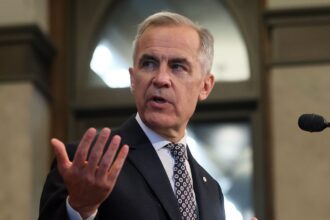In a dramatic shift that underscores the economic pressures facing North American trade relations, Canada announced yesterday it will indefinitely suspend its planned Digital Services Tax (DST) that had become a flashpoint in increasingly tense discussions with the United States. The decision comes amid mounting concerns over retaliatory tariffs threatened by the Trump administration and represents a significant policy reversal for Prime Minister Justin Trudeau’s government.
“We have reached a critical juncture where pragmatism must prevail,” Finance Minister Chrystia Freeland stated during a press conference in Ottawa. “While we remain committed to ensuring digital giants pay their fair share, we must balance this objective against broader economic considerations that affect everyday Canadians.”
The controversial tax, originally scheduled to take effect January 1, 2024, would have imposed a 3% levy on revenue generated by large digital companies operating in Canada. The measure specifically targeted tech behemoths like Google, Facebook, and Amazon, who have long faced criticism for generating substantial revenue in Canada while maintaining minimal tax exposure through offshore arrangements.
Economic analysts at the Royal Bank of Canada estimate the tax would have generated approximately CAD $1.2 billion annually for federal coffers. However, the potential economic damage from retaliatory American tariffs—potentially reaching as high as 25% on key Canadian exports—would have far outweighed these gains, according to internal government assessments obtained by CO24 Business.
The suspension marks a significant victory for U.S. trade representatives who had consistently denounced the DST as discriminatory against American companies. Former President Trump had been particularly vocal about the tax, calling it “a direct attack on American innovation” during a recent campaign rally in Michigan.
The timing of Canada’s announcement is particularly noteworthy, coming just days after Trump’s economic advisor Stephen Moore warned that the imposition of retaliatory tariffs was “not a matter of if, but when” should Canada proceed with implementation. With polls showing a tight presidential race in November, Canadian officials appear unwilling to risk becoming a target in America’s increasingly protectionist economic rhetoric.
“This isn’t surrender—it’s strategic recalibration,” explained Dr. Sophia Weiss, International Trade Policy Director at the University of Toronto. “The government is buying time while hoping for either a more favorable negotiating environment post-U.S. election or progress in the ongoing OECD multilateral tax framework discussions.”
Indeed, Finance Minister Freeland emphasized that Canada remains committed to the OECD’s inclusive framework on base erosion and profit shifting, which seeks to establish a global minimum corporate tax rate and more equitable taxation of digital services across borders. Over 130 countries have endorsed this approach in principle, though implementation timelines have repeatedly slipped.
For Canadian tech startups and mid-sized digital businesses, the announcement received mixed reactions. “We’ve always supported fair taxation of multinational tech giants,” said Marcel Duchamp, CEO of Montreal-based software developer Numeritech. “But not at the cost of triggering a broader trade war that would ultimately harm Canadian innovation more than help it.”
The suspension also raises questions about similar digital services taxes being considered or implemented in other jurisdictions, including the United Kingdom, France, and several other European nations. Many of these countries have faced similar pressure from the United States to delay or abandon such measures pending a global agreement.
As Canada News continues to follow this developing story, attention now turns to how this policy shift might affect other contentious trade issues between the historically close allies, including ongoing disputes over softwood lumber, dairy products, and aluminum exports.
In this high-stakes economic chess match between neighbors, one critical question remains: can the multilateral tax system be reformed quickly enough to address the legitimate concerns about digital taxation, or will powerful nations continue to exert bilateral pressure to protect their corporate champions at the expense of global tax equity?


















